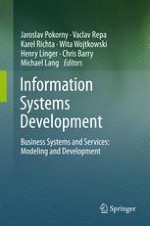2011 | OriginalPaper | Chapter
Making Business Systems in the Telecommunication Industry More Customer-Oriented
An Analysis of Real-Life Transformation Projects
Authors : Christian Czarnecki, Axel Winkelmann, Myra Spiliopoulou
Published in: Information Systems Development
Publisher: Springer New York
Activate our intelligent search to find suitable subject content or patents.
Select sections of text to find matching patents with Artificial Intelligence. powered by
Select sections of text to find additional relevant content using AI-assisted search. powered by
